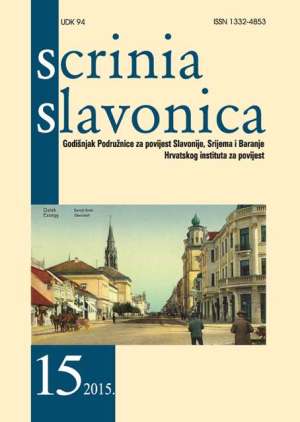Katoličko stanovništvo Zmajevca u drugoj polovici 18. stoljeća (1755.-1800.)
The Catholic Population of Zmajevac in the Second Half of the 18th Century (1755-1800)
Author(s): Eldina LovašSubject(s): History, 18th Century
Published by: Hrvatski institut za povijest
Keywords: South Baranya; Zmajevac; historical demography; population; parish registers;18th century;
Summary/Abstract: Baranya was, after the liberation from Ottoman rule and the suppression of Francis II Rákóczy’s uprising in the 18th century, exposed to various demographic changes – migrations, new immigrations and planned settlements of the population which led to the creation of a multiethnic and multinational environment. This trend was evident in particular settlements, such as Zmajevac in the 18th century, within the Baranja “triangle”. The analysis of registers of marriages confirmed that the inhabitants of Zmajevac married at a relatively early age. The registration in the registers of marriages included names, marital status (youngster/widower, maiden/widow), age and place of origin. The number of marriages in Zmajevac during the 18th century increased gradually. Remarriages due to the death of spouses were common. The data analysis of registers of births indicates that during the 18th century more male than female children were born in Zmajevac. The children were registered according to name, surname, father’s and mother’s name and the date of baptism. In Zmajevac during the 18th century 25 twins were born and one set of triplets. The register contains also the names of posthumous children and of children born out of wedlock. For illegitimate children usually only the mother’s name was registered while the father mostly remained unknown. The analysis of the register of deaths indicates that in Zmajevac more men than women died during the 18th century. This could be explained by the high birth rate of male children compared to female. Most of the inhabitants died between the age 0 and 18, and only in rare cases did they attain old age. The majority of the population died of illnesses and epidemics; nevertheless there were cases of violent death. Taking into consideration all the analysed data of all three registers, the conclusion can be drawn that the population of Zmajevac during the 18th century showed the characteristics of pre-transitional societies characterized by high birth, mortality and marriage rates.
Journal: Scrinia Slavonica
- Issue Year: 2015
- Issue No: 15
- Page Range: 111-132
- Page Count: 20
- Language: Croatian

